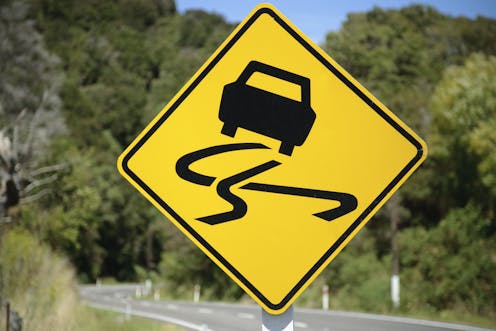Slow down Simeon Brown – bilingual traffic signs aren't an accident waiting to happen
- Written by Richard Shaw, Professor of Politics, Massey University

When the National Party’s transport spokesperson, Simeon Brown, questioned the logic of bilingual traffic signs, he seemed to echo his leader Christopher Luxon’s earlier misgivings about the now prevalent use of te reo Māori in government departments.
Genuine concern or political signalling in an election year? After all, Luxon himself has expressed interest in learning te reo, and also encouraged its use when he was CEO of Air New Zealand. He even sought to trademark “Kia Ora” as the title of the airline’s in-flight magazine.
And for his part, Brown has no problem with Māori place names on road signs. His concern is that important messaging about safety or directions should be readily understood. “Signs need to be clear,” he said. “We all speak English, and they should be in English.” Adding more words, he believes, is simply confusing.
It’s important to take Brown at his word, then, with a new selection of proposed bilingual signs now out for public consultation. Given the National Party’s enthusiastic embrace of AI to generate pre-election advertising imagery, one obvious place to start is with ChatGPT, which tells us:
Bilingual traffic signs, which display information in two or more languages, are generally not considered a driver hazard. In fact, bilingual signage is often implemented to improve safety and ensure that drivers of different language backgrounds can understand and follow the traffic regulations.
ChatGPT also suggests that by providing information about speed limits, directions and warnings, bilingual traffic signs “accommodate diverse communities and promote road safety for all drivers”.
Safety and culture
With mounting concern over AI’s potential existential threat to human survival, however, it’s probably best we don’t take the bot’s word for it. Fortunately, government transport agency Waka Kotahi has already examined the use of bilingual traffic signs in 19 countries across the Americas, Asia, Europe and the Middle East. It’s 2021 report states:
The use of bilingual traffic signage is common around the world and considered “standard” in the European Union. Culture, safety and commerce appear to be the primary impetuses behind bilingual signage.
Read more: Bilingual road signs in Aotearoa New Zealand would tell us where we are as a nation
Given Brown’s explicit preference for the use of English, it’s instructive that in the UK itself, the Welsh, Ulster Scots and Scots Gaelic languages appear alongside English on road signs in Wales, Northern Ireland and Scotland.
More to the point, on the basis of the evidence it reviewed, Waka Kotahi concluded that – providing other important design considerations are attended to – bilingual traffic signs can both improve safety and respond to cultural aspirations:
In regions of Aotearoa New Zealand where people of Māori descent are over-represented in vehicle crash statistics, or where they represent a large proportion of the local population, bilingual traffic signage may impart benefits in terms of reducing harm on our road network.
‘One people’
Politically, however, the problem with a debate over bilingual road signs is that it quickly becomes another skirmish in the culture wars – echoing the common catchcry of those opposed to greater biculturalism in Aotearoa New Zealand: “we are one people”.
It’s a loaded phrase, originally attributed to the Crown’s representative Lieutenant Governor William Hobson, who supposedly said “he iwi tahi tātou” (we are one people) at the signing of the Treaty of Waitangi in 1840.
Whether or not he said any such thing is up for debate. William Colenso, who was at Waitangi on the day and who reported Hobson’s words, thought he had. But Colenso’s account was published 50 years after the events in question (and just nine years before he died aged 89).
Either way, the assertion has since come to be favoured by those to whom the notion of cultural homogeneity appeals. It’s a common response to the increasing public visibility of te ao Māori (the Māori world).
But being “one people” means other things become singular too: one law, one science, one language, one system. In other words, a non-Māori system, the one many of us take for granted as simply the way things are.
Any suggestion that system might incorporate or coexist with aspects of other systems – indeed might benefit from them – tends to come up against the kind of resistance we see to such things as bilingual road signs.
Read more: Putting Aotearoa on the map: New Zealand has changed its name before, why not again?
Fretful sleepers
The discomfort many New Zealanders still feel with the use of te reo Māori in public settings brings to mind Bill Pearson’s famous 1952 essay, Fretful Sleepers.
In it, Pearson reflects on the anxiety that can seep unbidden into the lives of those who would like to live in a “wishfully untroubled world”, but who nonetheless sense things are not quite right out here on the margins of the globe.
Pearson lived in a very different New Zealand. But he had his finger on the same fear and defensiveness that can cause people to fret about the little things (like bilingual signs) when there are so many more consequential things to disrupt our sleep.
Anyway, Simeon Brown and his fellow fretful sleepers appear to be on the wrong side of history. Evidence suggests most New Zealanders would like to see more te reo Māori in their lives, not less. Two-thirds would like te reo taught as a core subject in primary schools, and 56% think “signage should be in both te reo Māori and English”.
If the experience in other parts of the world is anything to go by, bilingual signage will be just another milestone on the road a majority seem happy to be on.
Authors: Richard Shaw, Professor of Politics, Massey University





